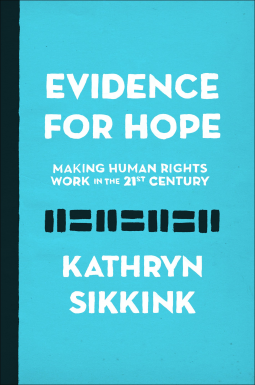
Evidence for Hope
Making Human Rights Work in the 21st Century
by Kathryn Sikkink
This title was previously available on NetGalley and is now archived.
Send NetGalley books directly to your Kindle or Kindle app
1
To read on a Kindle or Kindle app, please add kindle@netgalley.com as an approved email address to receive files in your Amazon account. Click here for step-by-step instructions.
2
Also find your Kindle email address within your Amazon account, and enter it here.
Pub Date Sep 13 2017 | Archive Date Jul 31 2017
Description
A history of the successes of the human rights movement and a case for why human rights work
Evidence for Hope makes the case that, yes, human rights work. Critics may counter that the movement is in serious jeopardy or even a questionable byproduct of Western imperialism. They point out that Guantánamo is still open, the Arab Spring protests have been crushed, and governments are cracking down on NGOs everywhere. But respected human rights expert Kathryn Sikkink draws on decades of research and fieldwork to provide a rigorous rebuttal to the pessimistic doubts about human rights laws and institutions. She demonstrates that change comes slowly and as the result of struggle, but in the long term, human rights movements have been vastly effective.
Attacks on the human rights movement’s credibility are based on the faulty premise that human rights ideas emerged in North America and Europe and were imposed on developing southern nations. Starting in the 1940s, Latin American leaders and activists were actually early advocates for the international protection of human rights. Sikkink shows that activists and scholars disagree about the efficacy of human rights because they use different yardsticks to measure progress. Comparing the present to the past, she shows that genocide and violence against civilians have declined over time, while access to healthcare and education has increased dramatically. Cognitive and news biases contribute to pervasive cynicism, but Sikkink’s investigation into past and current trends indicates that human rights is not in its twilight. Instead, this is a period of vibrant activism that has made impressive improvements in human well-being.
Exploring the strategies that have led to real humanitarian gains since the middle of the twentieth century, Evidence for Hope looks at how these essential advances can be supported and sustained for decades to come.
Advance Praise
"This important book argues that human rights has worked, does work, and can continue to do so. Connecting the past to the future, this is a history that is unashamed to teach us vital lessons."--Jeremy Adelman, coauthor of Worlds Together, Worlds Apart
"Kathryn Sikkink is one of the country's most distinguished scholars of human rights and a major figure in the study of international relations. In Evidence for Hope, she makes a powerful argument that rights ideals have made impressive progress around the world in the face of strong opposition. With its insights, erudition, and gusto, this wonderful book showcases her remarkable abilities and offers important lessons for wiser human rights policy."--Gary Bass, author of The Blood Telegram
Available Editions
| ISBN | 9780691170626 |
| PRICE | 35.00 |



